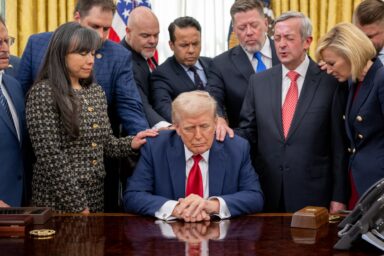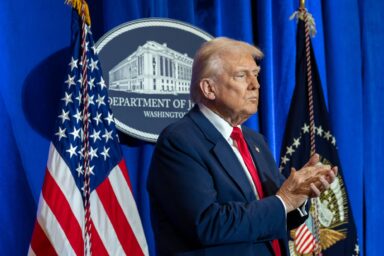As Cities Rumble and the Economy Burns, Democrats Need to Stop Fiddling
Failure to crack down on violence or compromise on federal unemployment benefits risks pushing voters toward Trump.
OPINION
Attention Democrats: It’s time for less talk, more action.
When it comes to strategy for defeating President Trump, Democrats of all stripes are remarkably unified. But two pressing issues can’t wait until November: violent demonstrations and pandemic-related financial assistance.
First, violence in the streets. Enough is enough. Polls show overwhelming opposition to violent protests, whether respondents are Black or white. The vast majority — almost 95 percent — of demonstrations related to racial injustice since the May 24 death of George Floyd have been nonviolent, according to a new report from a watchdog group. But perception is everything, especially when President Trump exaggerates the problem.
In cities like Portland, the strategy has been to avoid a crackdown and wait until everybody gets bored and goes home. But participation by armed white militants has kept protesters angry and active — with tragic consequences when high-powered assault rifles jump into the mix.
One reason that Democratic mayors have been showing restraint is that they want to avoid having Trump send in squads of federal law enforcement officers, an ill-considered and unnecessary approach. Mayors have plenty of other tools for controlling violence if problems escalate, including state police and the National Guard — and they should not hesitate to use them. Other possibilities include rigorous enforcement of curfews, or revoking bail for suspects who are arrested and released, then return to the front lines the next day.
So just do it — or risk pushing moderate or swing voters into casting their ballots for Trump.
“What we were afraid of is moderates saying, ‘I hate Donald Trump, but I need to be safe. I have to hold my nose and vote for him,’” Rendell said.
Ed Rendell, a former Democratic Pennsylvania governor, reached out to Joe Biden’s campaign last week urging a stronger response to violence by demonstrators — whether supporters of Black Lives Matter and racial justice reform, or armed white militants. “What we were afraid of is moderates saying, ‘I hate Donald Trump, but I need to be safe. I have to hold my nose and vote for him,’” Rendell said. Biden has strongly denounced violence by protesters, but his message has been drowned out by the noise.
Second, it’s time to kick-start what should be a national priority: reviving financial assistance for people and businesses directly affected by the pandemic. Democrats in the House have approved a second rescue package, but White House and Senate GOP negotiators said it was too expensive and refused to budge.
Democrats blame Republicans for the impasse. As a reason to vote against Trump, that argument might work, but it’s not a reason to vote for Joe Biden or anyone else. So it’s time for Democratic negotiators to swallow their pride and accept half a loaf, instead of holding out for a complete package.
As a campaign issue for Democrats, saying “we got you some help despite GOP opposition” is a lot more convincing than “we stood on principle, but you got nothing.”
This is a pocketbook issue, not an abstract debate. Millions of Americans are struggling to make rent or mortgage payments, buy groceries, or gas up their cars. As a campaign issue for Democrats, saying “we got you some help despite GOP opposition” is a lot more convincing than “we stood on principle, but you got nothing.”
After negotiations on a rescue package collapsed in early August, Democrats said they had offered to reduce the price tag of their $3.4 trillion bill by $1 trillion, but administration officials rejected the offer. Another conversation on August 27 between House Speaker Nancy Pelosi and White House Chief of Staff Mark Meadows failed to make progress.
Meanwhile, as politicians fiddle, some 30 million jobless Americans have gone for more than a month without the enhanced $600 weekly federal unemployment benefits that expired July 31.
For renters, who usually have lower incomes than homeowners, there was an immediate impact: In the first 10 days of August, landlords reported receiving 29 percent less rental revenue than during the same period in March, before the virus took hold. Trump signed an executive order September 1 preventing evictions through the end of 2020, which is helpful, but the rent is only deferred, creating thousands of dollars of debt for tenants to be repaid down the road.
Another likely consequence: By the end of September, 34.5 million households will risk having their utilities cut off for nonpayment, according to a new report. Earlier in the pandemic, governors and public utility commissions in 32 states passed moratoriums on utility shutoffs, but 10 have already expired and most others lapse in September and October.
In its monthly jobs report, the US Bureau of Labor Statistics said Friday that August’s unemployment rate dropped to 8.4 percent, though fewer new jobs were created than in June or July. And the BLS found that 24.2 million Americans were unable to work because employers closed, or cut back employee hours, because of the pandemic.
So for too many Americans, the outlook remains bleak: no jobs, growing debt, homes at risk… and no help. Democrats traditionally take pride in supporting programs and policies to benefit lower-income Americans — but it’s time for them to prove it, or risk paying the price on Election Day.
Related front page panorama photo credit: Adapted by WhoWhatWhy from Lorie Shaull / Flickr (CC BY-SA 2.0).


